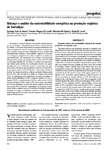Use este identificador para citar ou linkar para este item:
http://biblioteca.incaper.es.gov.br/digital/handle/item/504Registro completo de metadados
| Campo DC | Valor | Idioma |
|---|---|---|
| dc.contributor.author | SOUZA, J. L. de. | pt_BR |
| dc.contributor.author | CASALI, V.W. D. | pt_BR |
| dc.contributor.author | SANTOS, R. H. S. | pt_BR |
| dc.contributor.author | CECON, P. R. | pt_BR |
| dc.contributor.other | Jacimar Luis de Souza, Incaper. | pt_BR |
| dc.date.accessioned | 2015-01-09T15:23:13Z | - |
| dc.date.available | 2015-01-09T15:23:13Z | - |
| dc.date.created | 2008 | pt_BR |
| dc.date.issued | 2015-01-09 | pt_BR |
| dc.identifier.other | 4956 | pt_BR |
| dc.identifier.uri | http://biblioteca.incaper.es.gov.br/digital/handle/item/504 | - |
| dc.description | Os insumos e serviços utilizados na produção vegetal representam custo energético. Dependendo desses fatores e das produtividades obtidas, a conversão da produção em energia determinará a eficiência energética do sistema. A agricultura orgânica somente atingirá a missão de preservação ambiental se tiver comprovada sustentabilidade energética. Neste trabalho, objetivou-se caracterizar os balanços energéticos dos cultivos orgânicos e analisar sua sustentabilidade, em comparação aos sistemas convencionais. Monitoraram-se campos de produção de dez culturas, de 1991 a 2000 em Domingos Martins-ES. Os dados do sistema convencional foram obtidos pelas médias dos coeficientes técnicos da região. Quantificaram-se os coeficientes técnicos, convertendo suas grandezas físicas em equivalentes energéticos, expressos em kcal. O sistema orgânico gastou 4.571.159 kcal ha-1 e apresentou 12.696.712 kcal ha-1 de energia inserida na colheita, mostrando balanço médio de 2,78. Esse valor foi similar ao obtido no sistema convencional (1,93). As participações dos componentes nos gastos do sistema orgânico foram embalagem (35,8%), composto orgânico (17,2%), irrigação (12,6%), sementes/mudas (12,4%) e mão-de-obra (11,0%), serviços mecânicos (5,0%) e frete (4,5%). Se os custos com embalagens fossem eliminados, os gastos do sistema orgânico seriam reduzidos para 2.930.113 kcal ha-1, aumentando sua eficiência. A maioria dos cultivos orgânicos pode ser considerada sustentável em transformação de energia, com balanços superiores a 1,00 e produção média diária de 80.421 kcal ha-1 por dia, superior à necessidade mínima de 58.064 kcal ha-1. The inputs used in crop production represent an energetic cost. Depending on the inputs and on the achieved yields, the conversion of the harvest into energy will determine the energetic efficiency of the system. Organic agriculture will fully meet the goal of environmental conservation only if its energetic sustainability is accomplished. The objectives of this study were to characterize the energetic balance of organic vegetable production and to analyze its energetic sustainability, compared to conventional vegetable crop production systems. Field data were collected from ten vegetable crop fields, from 1991 to 2000 in Domingos Martins, Espírito Santo State, Brazil. Data from the conventional system were obtained in the region. The technical coefficients of the systems were quantified and converted to an energy equivalent (kcal). The general average of the organic system was an input of 4,571,159 kcal ha-1 and an output of 12,696,712 kcal ha-1 at harvest, presenting an energetic balance of 2.78. This balance was similar to the conventional system (1,93). The components of the energetic inputs in the organic system were packaging (35,8%), organic compost (17,2%), irrigation (12,6%), seeds/seedlings (12,4%) and labor (11,0%), machinery (5,0%) and transport (4,5%). If package costs were removed, the energetic inputs on the organic system would be reduced to 2,930,113 kcal ha-1, greatly improving its energetic efficiency. Most of the crops could be considered sustainable regarding energy conversion, presenting balances higher than 1.00. The daily average energy yield in the organic system was 80,421 kcal ha-1 day-1 and was considered sustainable, higher than the minimum estimated calories need (58.064 kcal ha-1). | pt_BR |
| dc.language | pt_BR | pt_BR |
| dc.publisher | Horticultura Brasileira, v. .26, n.4, 2008. | pt_BR |
| dc.subject | Agricultura orgânica | pt_BR |
| dc.subject | Produtividade | pt_BR |
| dc.subject | Sistemas de cultivo | pt_BR |
| dc.subject | Balanço energético | pt_BR |
| dc.title | Balanço e análise da sustentabilidade energética na produção orgânica de hortaliças. | pt_BR |
| dc.title.alternative | Energetic balance and sustainability analysis in the organic production of vegetable crops. | pt_BR |
| dc.type | -- | pt_BR |
| dc.ainfo.id | 4859 | pt_BR |
| dc.ainfo.lastupdate | 2015-01-09 | pt_BR |
| dc.ainfo.depositante | Merielem Frasson | pt_BR |
| dc.description.notes | Trabalho apresentado no 49º Congresso Brasileiro de Olericultura. Prêmio ABH 2009. | pt_BR |
| dc.subject.nalthesaurus | Organic agriculture | pt_BR |
| dc.subject.nalthesaurus | Yield | pt_BR |
| dc.subject.nalthesaurus | Crop systems | pt_BR |
| dc.subject.nalthesaurus | Energetic balance | pt_BR |
| dc.identifier.doi | http://dx.doi.org/10.1590/S0102-05362008000400003 | pt_BR |
| Aparece nas coleções: | Memória Técnica do Incaper  | |
Arquivos associados a este item:
| Arquivo | Descrição | Tamanho | Formato | |
|---|---|---|---|---|
| Revista-HB-Balanco-e-analise-energetica-2008-JACIMAR.pdf | 1,66 MB | Adobe PDF |  Visualizar/Abrir |
Os itens no repositório estão protegidos por copyright, com todos os direitos reservados, salvo quando é indicado o contrário.
